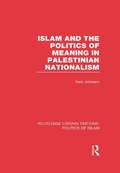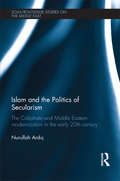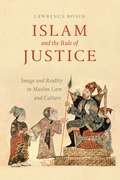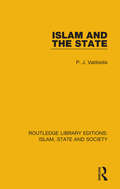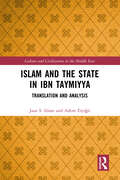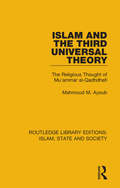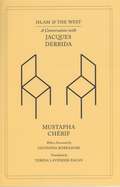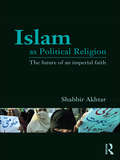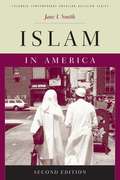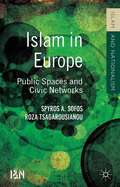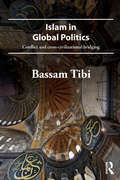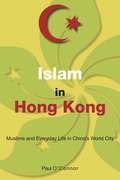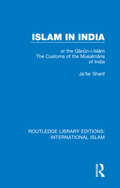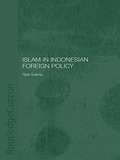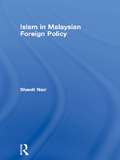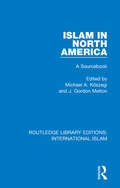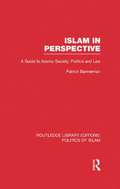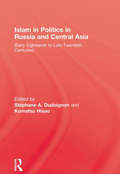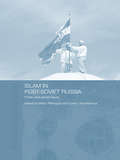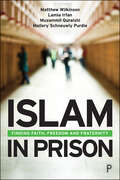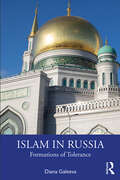- Table View
- List View
Islam and the Politics of Meaning in Palestinian Nationalism (Routledge Library Editions: Politics of Islam)
by Nels JohnsonThe intention of this book is to explore the relationship between an ideological idiom and the changing social movement in which it operates. The basic question is that of what roles an Islamic symbol complex played in different phases of the Palestinian nationalist movement, and what were the socio-economic factors which help to explain, and are themselves partially explained by, the appearance of these roles. Islam was ideologically ‘appropriate’ at different stages in the development of the movement, and this study examines in what way, and why. First published in 1982.
Islam and the Politics of Secularism: The Caliphate and Middle Eastern Modernization in the Early 20th Century (SOAS/Routledge Studies on the Middle East)
by Nurullah ArdicThis book examines the process of secularization in the Middle East in the late 19th and early 20th century through an analysis of the transformation and abolition of Islamic Caliphate. Focusing on debates in both the center of the Caliphate and its periphery, the author argues that the relationship between Islam and secularism was one of accommodation, rather than simply conflict and confrontation, because Islam was the single most important source of legitimation in the modernization of the Middle East. Through detailed analysis of both official documents and the writings of the intellectuals who contributed to reforms in the Empire, the author first examines the general secularization process in the Ottoman Empire from the late 18th century up to the end of the 1920s. He then presents an in-depth analysis of a crucial case of secularization: the demise of Islamic Caliphate. Drawing upon a wide range of secondary and primary sources on the Caliphate and the wider process of political modernization, he employs discourse analysis and comparative-historical methods to examine how the Caliphate was first transformed into a "spiritual" institution and then abolished in 1924 by Turkish secularists. Ardıç also demonstrates how the book’s argument is applicable to wider secularization and modernization processes in the Middle East. Deriving insights from history, anthropology, Islamic law and political science, the book will engage a critical mass of scholars interested in Middle Eastern studies, political Islam, secularization and the near-global revival of religion as well as the historians of Islam and late-Ottoman Empire, and those working in the field of historical sociology and the sociology of religion as a case study.
Islam and the Rule of Justice: Image and Reality in Muslim Law and Culture
by Lawrence RosenIn the West, we tend to think of Islamic law as an arcane and rigid legal system, bound by formulaic texts yet suffused by unfettered discretion. While judges may indeed refer to passages in the classical texts or have recourse to their own orientations, images of binding doctrine and unbounded choice do not reflect the full reality of the Islamic law in its everyday practice. Whether in the Arabic-speaking world, the Muslim portions of South and Southeast Asia, or the countries to which many Muslims have migrated, Islamic law works is readily misunderstood if the local cultures in which it is embedded are not taken into account. With Islam and the Rule of Justice, Lawrence Rosen analyzes a number of these misperceptions. Drawing on specific cases, he explores the application of Islamic law to the treatment of women (who win most of their cases), the relations between Muslims and Jews (which frequently involve close personal and financial ties), and the structure of widespread corruption (which played a key role in prompting the Arab Spring). From these case studie the role of informal mechanisms in the resolution of local disputes. The author also provides a close reading of the trial of Zacarias Moussaoui, who was charged in an American court with helping to carry out the 9/11 attacks, using insights into how Islamic justice works to explain the defendant’s actions during the trial. The book closes with an examination of how Islamic cultural concepts may come to bear on the constitutional structure and legal reforms many Muslim countries have been undertaking.
Islam and the State (Routledge Library Editions: Islam, State and Society)
by P. J. VatikiotisExamining the theoretical problems which arose when the modern European ideology of nationalism was adopted by Muslim societies organized into formally modern states, this book, first published in 1987, also deals with the practical difficulties arising from the doctrinal incompatibility between Islam and the non-Muslim concept of the territorial nation-state. It illustrates this conflict with a consideration of the record of several states in the Islamic world. It suggests that whereas the state, an organization of power, has been a most durable institution in Islamic history, the legitimacy of the nation-state has always been challenged in favour of the wide Islamic Nation, the "umma", which comprises all the faithful without reference to territorial boundaries. To this extent too, the more recent conception of Arab nationalism projects a far larger nation-state than the existing territorial states in the Arab world today. This title will be of interest to students of Middle Eastern studies.
Islam and the State in Ibn Taymiyya: Translation and Analysis (Culture and Civilization in the Middle East)
by Jaan S. Islam Adem Eryiğit"Proto-Salafist" 14th-century theologian Ibn Taymiyya is recognized as the intellectual forefather of contemporary Salafism and Jihadism. This volume offers a unique approach to the study of Ibn Taymiyya, by offering an English translation of his fundamental political treatise, The Office of Islamic Government, and shorter collections from The Collected Fatwas and The Prophetic Way, and Islamic Governance in Reconciling between the Ruler and the Ruled. The volume not only sheds light on these primary sources through translation and annotation, but also offers a theoretical analysis of Ibn Taymiyya’s thought and how his legal views can be reconciled with current trends in Islamic political theory. The analysis provides an overview of Ibn Taymiyya’s geopolitical context, and includes an original study of his normative political thought. In examining the contemporary implications of Ibn Taymiyya’s political theology, the authors explore his doctrine of the Islamic state in the context of Islamic decolonial theory. Islam and the State in Ibn Taymiyya will appeal to academics in the fields of political science and religious studies, particularly within the field of Islamic history.
Islam and the Third Universal Theory: The Religious Thought of Mu'ammar al-Qadhdhafi (Routledge Library Editions: Islam, State and Society)
by Mahmoud M. AyoubThis volume, first published in 1987, was the first to examine in depth the religious thought of Colonel Mu’ammar al-Qadhdhafi and its central place in his political, social and economic theories. The work is based on sources inaccessible except in the original Arabic. While drawn from Islamic concepts and sources, Qadhdhafi’s religious views were original. His religious openness and universal view of Islam and other monotheistic religions in particular will be surprising to those familiar with only the image associated with him in the Western mind. This title is a useful source for students of both politics and Islamic studies.
Islam and the West: A Conversation with Jacques Derrida
by Mustapha Cherif Teresa Lavender FaganIn the spring of 2003, Jacques Derrida sat down for a public debate in Paris with Algerian intellectual Mustapha Chérif. The eminent philosopher arrived at the event directly from the hospital where he had just been diagnosed with pancreatic cancer, the illness that would take his life just over a year later. That he still participated in the exchange testifies to the magnitude of the subject at hand: the increasingly distressed relationship between "Islam and the West", and the questions of freedom, justice, and democracy that surround it. As Chérif relates in this account of their dialogue, the topic of Islam held special resonance for Derrida -- perhaps it is to be expected that near the end of his life his thoughts would return to Algeria, the country where he was born in 1930. Indeed, these roots served as the impetus for their conversation, which first centers on the ways in which Derrida's Algerian-Jewish identity has shaped his thinking. From there, the two men move to broader questions of secularism and democracy; to politics and religion and how the former manipulates the latter; and to the parallels between xenophobia in the West and fanaticism among Islamists. Ultimately, the discussion is an attempt to tear down the notion that Islam and the West are two civilizations locked in a bitter struggle for supremacy and to reconsider them as the two shores of the Mediterranean -- two halves of the same geographical, religious, and cultural sphere.
Islam as Political Religion: The Future of an Imperial Faith
by Shabbir AkhtarThis comprehensive survey of contemporary Islam provides a philosophical and theological approach to the issues faced by Muslims and the question of global secularisation. Engaging with critics of modern Islam, Shabbir Akhtar sets out an agenda of what his religion is and could be as a political entity. Exploring the views and arguments of philosophical, religious and political thinkers, the author covers a raft of issues faced by Muslims in an increasingly secular society. Chapters are devoted to the Qur’an and Islamic literature; the history of Islam; Sharia law; political Islam; Islamic ethics; and political Islam’s evolving relationship with the West. Recommending changes which enable Muslims to move from their imperial past to a modest role in the power structures of today’s society, Akhtar offers a detailed assessment of the limitations and possibilities of Islam in the modern world. Providing a vision for an empowered yet rational Islam that distances itself from both Islamist factions and Western secularism, this book is an essential read for students and scholars of Islamic studies, religion, philosophy and politics.
Islam in America (Columbia Contemporary American Religion Series)
by Jane SmithThis richly textured, critically acclaimed portrait of American Muslims introduces the basic tenets of the Muslim faith, surveys the history of Islam in North America, and profiles the lifestyles, religious practices, and worldviews of Muslims in the United States. The volume focuses specifically on the difficulty of living faithfully and adhering to tradition while adapting to an American way of life and addresses the role of women in Muslim culture, the raising and education of children, appropriate dress and behavior, and incidences of prejudice and unfair treatment. The second edition of Islam in America features a new chapter on post-9/11 realities, which covers infringements on civil rights and profiling, participation in politics, transformations in Islamic law, pluralism and identity issues, foreign influences, anti-Islamic sentiment, intra-Islamic tensions, and the quest for a moderate Islam. Source notes, glossary, and additional resources also reflect recent developments and scholarship.
Islam in American Prisons: Black Muslims' Challenge to American Penology (Law, Justice and Power)
by Hamid Reza KushaThe growth of Islam both worldwide and particularly in the United States is especially notable among African-American inmates incarcerated in American state and federal penitentiaries. This growth poses a powerful challenge to American penal philosophy, structured on the ideal of rehabilitating offenders through penance and appropriate penal measures. Islam in American Prisons argues that prisoners converting to Islam seek an alternative form of redemption, one that poses a powerful epistemological as well as ideological challenge to American penology. Meanwhile, following the events of 9/11, some prison inmates have converted to radical anti-Western Islam and have become sympathetic to the goals and tactics of the Al-Qa'ida organization. This new study examines this multifaceted phenomenon and makes a powerful argument for the objective examination of the rehabilitative potentials of faith-based organizations in prisons, including the faith of those who convert to Islam.
Islam in Asia: Changing Political Realities
by Jason F. Isaacson Colin RubensteinWhile the collapse of the Soviet Union and the Eastern bloc has contributed to the decline of communism as a revolutionary political force, religious and ethnic issues have now assumed renewed and increased significance in South East Asia. Since the Islamic resurgence of the early 1980s and 1990s, elements of a more radical political Islam have migrated from the Middle East to Asia. If left unchecked these radical elements could aggravate a number of security and political crises in countries weakened by the consequences of the devastating Asian financial crisis. In an increasingly globalized world, it is not only the exchange of tangible goods across borders that is transmitted with multiplying efficiency and speed, but the exchange of ideas across seamless borders, assisted by the ever-improving communications technology of the Internet and electronic mail. Paradoxically, globalization both creates social change that can spark a backlash in the form of Islamic radicalism, and provides improved means for the spread of Islamic ideals.This critical volume examines the advance and contours of Islamicism and analyzes the potential consequences that such activity poses in South East Asian region. The study tracks the activities of external countries such as Iran, Libya, Pakistan, and Saudi Arabia and highlights the key roles these countries play in East Asian economies, politics, religion, and weapons procurement. It focuses on four locations in South East Asia: Indonesia, Malaysia, the southern Philippines, and southern Thailand. The introduction treats the Islamic resurgence in Asia, its links to Middle Eastern Islam, and its external influences. Chapters 1 and 2 examine ""Islam and Politics in the New Indonesia"" and ""Islam, Society, Politics, and Change in Malaysia""; chapters 3 and 4 discuss in detail ""Militant Islamic Extremism in the Southern Philippines"" and ""Militant Islamic Separatism in Southern Thailand."" A conclusion follows with an assessment of religious ext
Islam in Europe
by Spyros A. Sofos Roza TsagarousianouDrawing upon extensive fieldwork and suggesting novel ways of approaching the phenomenon of European Islam and the continent's Muslim communities, Islam in Europe examines how European Muslims construct notions or identity, agency and belonging, how they negotiate and redefine the notions of religion, tradition, authority and cultural authenticity.
Islam in Global Politics: Conflict and Cross-Civilizational Bridging
by Bassam TibiReaching beyond traditionally politicised scholarship to provide a unique perspective on the place of religion and culture in global and local politics, this book examines the impact of Islam on 'civilizational' relations between different groups and polities. Bassam Tibi takes a highly original approach to the topic of religion in world politics, exploring the place of Islam in society and its frequent distortion in world politics to the more radical Islamism. Looking at how this becomes an immediate source of tension and conflict between the secular and the religious, Tibi rejects the 'clash of civilizations' theory and argues for the revival of Islamic humanism to help bridge the gap. Chapters expand on: inter-civilizational conflict in global politics dialogue between religious and secular, East and West western concepts of Islamism euro-Islam and the Islamic diaspora in Europe Islamic humanism as a tool for bridging civilizations. Shedding new light on the highly topical subject of Islam in politics and society, this book is an essential read for scholars and students of international politics, Islamic studies and conflict resolution.
Islam in Hong Kong
by Paul O'ConnorMore than a quarter of a million Muslims live and work in Hong Kong. Among them are descendants of families who have been in the city for generations, recent immigrants from around the world, and growing numbers of migrant workers. Islam in Hong Kong explores the lives of Muslims as ethnic and religious minorities in this unique post-colonial Chinese city. Drawing on interviews with Muslims of different origins, O'Connor builds a detailed picture of daily life through topical chapters on language, space, religious education, daily prayers, maintaining a halal diet in a Chinese environment, racism, and other subjects. Although the picture that emerges is complex and ambiguous, one striking conclusion is that Muslims in Hong Kong generally find acceptance as a community and do not consider themselves to be victimised because of their religion.
Islam in India: or the Qᾱnῡn-i-Islᾱm The Customs of the Musalmᾱns of India (Routledge Library Editions: International Islam #5)
by Ja'far SharifFirst published in 1832, this work was at the time considered an authoritative account of the beliefs and practices of the Musalmᾱns of India. This 1921 reprint includes an introduction from the editor, Dr William Crooke, which presents what is known about both Ja’far Sharif and the translator, G. A. Herklots. It also distinguishes the original material from the changes made by the translator and compares the book with other similar works published in the nineteenth-century. This book will be of interest to those studying the history of Islam, the history of ethnography and the British Empire.
Islam in Indonesian Foreign Policy: Domestic Weakness and the Dilemma of Dual Identity (Politics In Asia Ser.)
by Rizal SukmaThis companion volume to the highly successful Islam in Malaysian Foreign Policy explores the extent to which foreign policy in the world's largest Muslim nation has been influenced by Islamic considerations.
Islam in Liberalism
by Joseph A. MassadIn the popular imagination, Islam is often associated with words like oppression, totalitarianism, intolerance, cruelty, misogyny, and homophobia, while its presumed antonyms are Christianity, the West, liberalism, individualism, freedom, citizenship, and democracy. In the most alarmist views, the West's most cherished values--freedom, equality, and tolerance--are said to be endangered by Islam worldwide. Joseph Massad's Islam in Liberalism explores what Islam has become in today's world, with full attention to the multiplication of its meanings and interpretations. He seeks to understand how anxieties about tyranny, intolerance, misogyny, and homophobia, seen in the politics of the Middle East, are projected onto Islam itself. Massad shows that through this projection Europe emerges as democratic and tolerant, feminist, and pro-LGBT rights--or, in short, Islam-free. Massad documents the Christian and liberal idea that we should missionize democracy, women's rights, sexual rights, tolerance, equality, and even therapies to cure Muslims of their un-European, un-Christian, and illiberal ways. Along the way he sheds light on a variety of controversial topics, including the meanings of democracy--and the ideological assumption that Islam is not compatible with it while Christianity is--women in Islam, sexuality and sexual freedom, and the idea of Abrahamic religions valorizing an interfaith agenda. Islam in Liberalism is an unflinching critique of Western assumptions and of the liberalism that Europe and Euro-America blindly present as a type of salvation to an assumingly unenlightened Islam.
Islam in Malaysian Foreign Policy (Politics in Asia)
by Shanti NairA case study of a multi-ethnic Muslim state and a contribution to the study of the domestic functions of foreign policy. The book also addresses the real and imagined significance of Islam as a force in contemporary global politics.
Islam in Modern Thailand: Faith, Philanthropy and Politics (Routledge Contemporary Southeast Asia Series)
by Rajeswary Ampalavanar BrownThis book addresses the complexity of Islam in Thailand, by focusing on Islamic charities and institutions affiliated to the mosque. By extrapolating through Islam and the waqf (Islamic charity) in different regions of Thailand the diversity in races and institutions, it demonstrates the regional contrasts within Thai Islam. The book also underlines the importance of the internal histories of these separate spaces, and the processes by which institutions and ideologies become entrenched. It goes on to look at the socio economic transformation that is taking place within the context of trading networks through Islamic institutions and civil networks linked to mosques, madrasahs and regional power brokers. Brown casts this study of private Islamic welfare as strengthening rather than weakening relations with the secular Thai state. The current regime’s effectiveness in coopting these Muslim elites, including Lutfi and Wisoot, into state bureaucracies assists in widening their popular base in the south, in the north-east, and in Bangkok. Such appointments were efficacious in reinforcing the elite’s Islamic identity within a modern, secular, literate, and cosmopolitan Thai culture. In challenging existing studies of Thai Muslims as furtive protest minorities, this book diverts our attention to how Islamic philanthropy provides the logic and dynamism behind the creation of autonomous spaces for these independent groups, affording unusual insights into their economic, political and social histories.
Islam in North America: A Sourcebook (Routledge Library Editions: International Islam #2)
by Michael A. Kőszegi and J. Gordon MeltonFirst published in 1992, this book focuses on the Muslim community and how it has developed in North America. Divided into eight sections, it traces the history of the Muslim community in North America from the nineteenth century to the end of the twentieth-century and examines different aspects of the community such as Sectarian Movements, Islam in the African American community and points of contact between Christian and Islamic communities. The text includes a number of bibliographies to aid further study and closes with a helpful directory of Muslim organizations and centers in North America. This book will be of particular interest to those studying Islam and Religion in North America.
Islam in Perspective: A Guide to Islamic Society, Politics and Law (Routledge Library Editions: Politics of Islam)
by Patrick BannermanThere has been a significant upsurge of western interest in the political manifestations and significance of Islam in the last decade, fuelled by the notion of Islamic ‘revival’, the Iranian revolution and by events in countries as diverse as Egypt, Pakistan and Sudan. Oil power and its effect on the international economic order, the relationship of Muslim countries with the superpowers and the continuation of the Arab-Israeli conflict have also served to focus attention on Islamic politics and, in particular, on the notion of Islamic reassertion. As the author of this book argues, one result of this interest has been the development of a view of Islam as monolithic and implacable. He takes a broad view of the intellectual and cultural history of Islam, emphasising the extraordinary diversity of Islamic societies and the ways in which the ideal is often pragmatically adapted to reality. In this wider social and historical context, the nature of Islamic revival is then reassessed. First published in 1988.
Islam in Politics in Russia and Central Asia: Early Eighteenth to Late Twentieth Centuries
by Komatsu Hisao Stephane A. DudolgnonFirst Published in 2001. This volume contains the proceedings of the international colloquium held by the IAS Project in October 1999. These papers deal with the modem and contemporary history of Central Eurasia, for a comprehensive reflection on various phenomena that led to a political valuation of Islam under non-Muslim domination, whether Russian or Chinese, since the beginning of the 18th century. A comparative approach to the current situations in the Russian Federation and the newly independent states of Central Asia has allowed us to study the various modes of the political instrumentalization of Islam, by both political power and opposition, in such various areas as the Ferghana Valley in Uzbekistan and the Volga-Urals region of Russia.
Islam in Post-Soviet Russia: Public And Private Faces
by Hilary Pilkington Galina YemelianovaThis book, based on extensive original research in the field, analyses the political, social and cultural implications of the rise of Islam in post-Soviet Russia. Examining in particular the situation in Tatarstan and Dagestan, where there are large Muslim populations, the authors chart the long history of Muslim and orthodox Christian co-existence in Russia, discuss recent moves towards greater autonomy and the assertion of ethnic-religious identities which underlie such moves, and consider the actual practice of Islam at the local level, showing the differences between "official" and "unofficial" Islam, how ceremonies and rituals are actually observed (or not), how Islam is transmitted from one generation to the next, the role of Islamic thought, including that of radical sects, and Islamic views of men and women's different roles. Overall, the book demonstrates how far Islam in Russia has been extensively influenced by the Soviet and Russian multi-ethnic context.
Islam in Prison: Finding Faith, Freedom and Fraternity
by Matthew Wilkinson Muzammil Quraishi Lamia Irfan Mallory Schneuwly PurdieAre you a prison officer who feels nervous about dealing with Muslims on the wings? Are you a prison chaplain who wants to know how your chaplaincy affects the lives of prisoners? Are you a policymaker who needs a robust base of evidence for Islam in prison? Are you an academic or a journalist seeking ground-breaking social science in a contentious field? Based on original evidence from 279 Muslim prisoners and 79 prison officers, we explore how Muslims come to be incarcerated, how the practice of Islam affects prison life and rehabilitation, the types of Islam and the effects of Islamic conversion in prison and the professional practice of officers and chaplains. We also investigate the common belief that incarceration fosters Islamist extremism and suggest improvements to faith provision and rehabilitative opportunities for Muslim prisoners.
Islam in Russia: Formations of Tolerance
by Diana GaleevaIslam in Russia is a rare scholarly attempt to understand the tolerant nature of Islam in the modern Russian Federation since the state’s official acceptance of Islam.The book explores the key factors that have contributed, over time, to the establishment of a co-existent form of Islam in modern multi-ethnic and multinational Russia. It also probes discussion of the role that Russian Muslim intellectuals have played in forming contemporary Russian Islam. It concludes that the co-existent form of Islam in Russia can be linked to three key factors: its historical emergence, the intellectual culture, and strong regional identities.This original and engaging examination of the development and identity of Islam in Russia is a useful resource for students and scholars of Global Islam, Islam in Europe, History of Russia, Islamic History, Islamic Thought and Modern Religious History.
